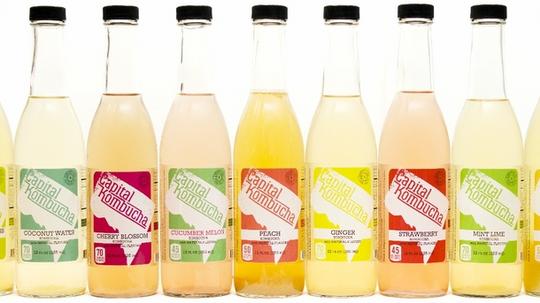

Founded by a trio of George Washington University business school students, the Capital Kombucha fruity nectar-like drink has rapidly gained traction in Washington, D.C. What was first a home-brewed experiment in 2011 has now transformed into a fully-fledged business that is expected to grow in annual sales by about 200 percent in 2014. Now after just two years of production, the District's first kombucha brewery is planning on expanding.
It's about time, too, considering the fact that the Capital Kombucha crew is making roughly 500 bottles of every week in the company's mere 350-square-foot workspace in Union Kitchen with only a portable fan to keep them from passing out in this grueling heat.
"To date, we've entirely bootstrapped this company," said Andreas Schneider, one of the Capital Kombucha founders. With deliveries sent to 160 area shops, including Whole Foods, Safeway and Glen's Garden Market, Schneider and his team are talking to investors about increasing production capacity.
Expansion makes sense for Capital Kombucha. In an interview with The Washington Post, co-founders Schneider, Daniel Lieberman and John Lee said that the company recently turned a small profit. Annual sales grew five-fold last year, Schneider added, although he would not disclose the company's revenue. He did say that they are on track to surpass six figures this year.
For those unfamiliar with Capital Kombucha, the fermented tea drink is flavored with fresh fruit and herbs before being bottled, boxed and delivered to its shop destination. It took the company six to eight months to get the flavors right, but now Capital Kombucha sells 11 varieties, including basil lemongrass, cherry blossom and cucumber melon.
A typical week in the life of a Capital Kombucha worker involves making "several large drums of iced tea using organic black and green tea blends," reports The Washington Post. Employees are responsible for checking the pH and taste of the mixture multiple times throughout the day in order to keep track of all the yeast and bacteria action.
After it's fermented, the drinks are then bottled four at a time with a small machine and then sent to a refrigerated warehouse out in Capitol Heights. The succulent substance has a three-month shelf life, but truth be told, they rarely last that long in a store once delivered.




